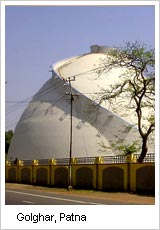|
Introduction:
PATNA the provincial capital of Bihar dates back in the Indian
history when the town was called Patliputra and later on it
was also called Kusumpura. The city was visited by Lord Buddha
in the 6th century B.C. Patliputra, in the time of Ashoka
became the centre from where messengers of peace and international
understanding were sent to all over India and beyond. The
glories of the city revived with the rise of the Gupta Empire
in the early 4th century A.D. and Chandragupta I, who was
the first emperor of the Gupta dynasty, had his capital here.
Fahian, Chinese pilgrim, who visited this city in early 5th
century A.D, has left a very rich description of the place.
Bodhgaya :
Located in the state of Bihar, Bodhgaya along with Sarnath
and Kushinagar are the most sacred places for the Buddhists
around the country. It is here in Bodhgaya that Buddha is
supposed to have attained enlightenment under the Bodhi Tree.
The tree from the original sapling still stands in the temple
premises The magnificent Mahabodhi temple stands adjacent
to this bodhi tree. The temple stands on the site of the ancient
temple erected by Ashoka in the
3rd century BC. The inscriptions here describe the visits
of pilgrims from Sri Lanka, Myanmar and China between 7th
and 10th century AD.
Nalanda :
Nalanda is one of the places distinguished as having been
blessed by the presence of the Buddha, it later became particularly
renowned as the site of the great monastic university of the
same name, which was to become the crown jewel of the development
of Buddhism in India. The name may derive from one of Shakyamuni's
former births, when hewas a king whose capital was here. Nalanda
was one of his epithets meaning "insatiable in
giving."
Golghar :
Golghar or the round house, the huge granary was built in
1786 by Captain John Garstin, at the behest of the then administrator,
Warren Hastings. Bihar experienced severe draught that resulted
in acute famine in the year 1770. Alarmed by the situation
faced by the people, this massive granary was constructed
for the British army. The enormous structure is 29 m high
and is 3.6 m wide at the base. |
|
 |

